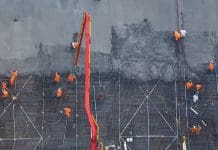Home secretary Priti Patel has announced the launch of a new points-based immigration system which will give priority to ‘highly skilled’ workers
The immigration system, which takes effect from 1 January 2021, will assign points for specific skills, qualifications, salaries or professions and visas will only be awarded to those who gain enough points.
The government says it “has listened to the clear message from the 2016 referendum and the 2019 General Election and will end the reliance on cheap, low-skilled labour coming into the country.”
Overall levels of migration will be reduced, with tighter security and a better experience for those coming to the UK.
The new immigration system will treat EU and non-EU citizens equally. But, the government says it will give top priority to those with the “highest skills”, including scientists, engineers and academics.
Patel said: “Today is a historic moment for the whole country.
“We’re ending free movement, taking back control of our borders and delivering on the people’s priorities by introducing a new UK points-based immigration system, which will bring overall migration numbers down.
“We will attract the brightest and the best from around the globe, boosting the economy and our communities, and unleash this country’s full potential.”
✅ Introducing a new points-based immigration system from 2021.
✅ Taking back control of our borders.
✅ Attracting the brightest and best talent from around the world.Sign up here to stay informed: https://t.co/ZPseKZzg11 #PointsBasedSystem #Immigration pic.twitter.com/ofqXsxdKSQ
— Home Office (@ukhomeoffice) February 19, 2020
Construction industry response
Chief executive of the Federation of Master Builders (FMB), Brian Berry, said: “If we are to have an infrastructure revolution and build a million new homes over the next five years, we will need to have an immigration system that allows for key construction workers of all skill levels to come [to the] UK of all skill levels.
“Today’s announcement that there will no longer be a route for “low skill” workers to come to the UK after next year will hamper the construction industry’s capacity to deliver on key projects.
“We will need general labourers as much as architects or surveyors. They are a core part of the construction industry and it’s simply unrealistic to assume the domestic workforce will fill this gap in the next nine months.”
While the CLC welcomed the government migration policy with reservations.
Mark Reynolds, Mace CEO and CLC Skills lead, said: “Led by the CLC, organisations across the sector have been investing heavily in developing local ‘homegrown’ talent for our industry, working together to create a clear route from school and training into full time employment in construction for people across the UK.
“However, we still face a significant talent gap and for the time being must rely on being able to access the right mix of people and expertise from overseas to effectively meet the UK’s infrastructure and built environment requirements.
“We are pleased to have clarity on this Government’s proposals for the UK’s future immigration system; but unfortunately the new system is likely to make it harder for the UK construction sector to deliver the homes and infrastructure we so desperately need.
“We welcome the salary thresholds being lowered to £25,600 in line with the MAC recommendations, however the decision to set skills thresholds to RQF3-5 is a disappointment, as it disregards skilled trades such as bricklayers and carpenters are qualified to level RQF2.
“This decision will impact on the ability of the sector to deliver the homes we so desperately need to solve the housing crisis.”
CITB strategy and policy director Steve Radley, said: “CITB cautiously welcomes lowering the salary threshold for skilled migrants, increasing the number of construction occupations eligible to work in the UK, and the commitment to monitor and respond to skills shortages.
“These policies are essential in light of the government’s expanded public investment programme and big ambitions for new homes.
“However, we need to see how this will work in practice, and to agree how we can minimise the impact of restrictions on low skilled workers. We will also work with the Government to ensure self-employed people can continue to work in the UK construction industry through a new route that doesn’t require employer sponsorship.
“We also note the government’s commitment to investing in homegrown talent and look forward to discussing how the apprenticeship system and Further Education can deliver better outcomes for industry.”














